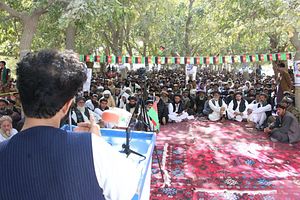KABUL – Clad in a blue headscarf, Saleha Soadat appeared on campaign posters around the Afghan capital, Kabul. She was running for a seat in Afghanistan’s parliament.
A former journalist, Soadat was among hundreds of young candidates – journalists, entrepreneurs, government employees, and civil society activists – that were competing for 249 parliament seats, a wave of young people that injected hope into the electoral process: Hope for change and hope to move past the country’s warlord-dominated political landscape.
“I voted to see change,” says Mohammad Imran, a 20-year-old voter from Paktia province, in the eastern region of Afghanistan. “I voted for a young candidate who holds a Masters degree.”
Soadat, in her 20s, has been in public life for a decade. Her first job was as a radio reporter. Soadat later joined Nai Supporting Open Media in Afghanistan, an independent media institute, to train young journalists.
In 2010, when Soadat graduated from Kabul University with a degree in journalism, TOLOnews, the largest TV network in the country, hired her as national political and human rights reporter. She became their parliamentary reporter for five years. “As a parliamentary reporter, I could see many MPs were there to trade, and they were unaware of their authorities,” Soadat told The Diplomat.
Many of Soadat’s campaign posters read: “Proctorship is a responsibility, not a privilege.”
“We had a significant number of young educated candidates,” says Yaser Ahmadzai, who directs the Afghanistan Institute of Peace, an independent Kabul-based institute. “They are here to make a difference.”
Afghanistan’s Independent Election Commission (IEC) estimated that at least 60 to 65 percent of candidates this year were below the age of 40. The many young candidates were largely on a mission to bring change to a country where 60 percent of people live under the poverty line, government corruption is widespread, and war has raged for decades.

































